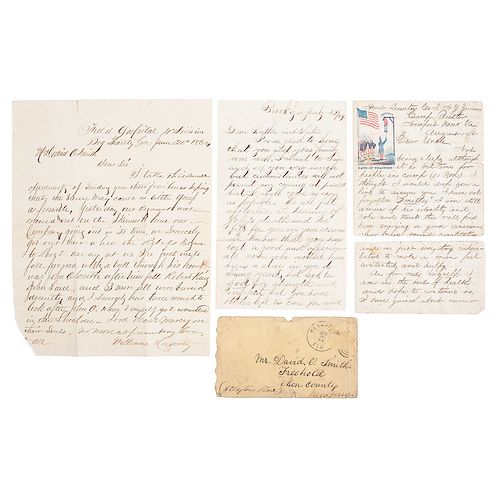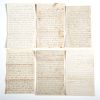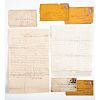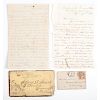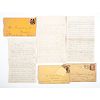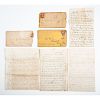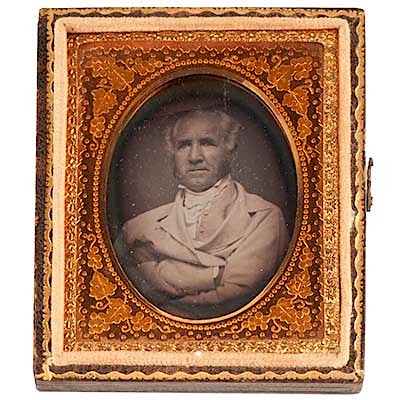John O. Smith, 35th New Jersey Infantry, KIA, Civil War Archive
About Seller
6270 Este Ave.
Cincinnati , OH 45232
United States
With offices in Cincinnati, Cleveland and Denver, Cowan’s holds over 40 auctions each year, with annual sales exceeding $16M. We reach buyers around the globe, and take pride in our reputation for integrity, customer service and great results. A full-service house, Cowan’s Auctions specializes in Am...Read more
Two ways to bid:
- Leave a max absentee bid and the platform will bid on your behalf up to your maximum bid during the live auction.
- Bid live during the auction and your bids will be submitted real-time to the auctioneer.
Bid Increments
| Price | Bid Increment |
|---|---|
| $0 | $25 |
| $500 | $50 |
| $1,000 | $100 |
| $2,000 | $250 |
| $5,000 | $500 |
| $10,000 | $1,000 |
| $20,000 | $2,500 |
| $50,000 | $5,000 |
| $100,000 | $10,000 |
About Auction
Nov 16, 2018
Cowan’s Fall American History: Premier Auction features over 200 lots including early photographs, documents, manuscripts, broadsides, flags, and more dating from the Revolutionary War period to the mid-20th Century, many representing important landmark moments in American history. Cowan's Auctions dawnie@cowans.com
- Lot Description
Lot of 20 letters, comprised of 15 from John O. Smith to his family, two from W.H. Rossell to David Smith (John's father, Rossell is a cousin), one from Augustus Findley to James Smith (cousin), one from Thomas N. Smith to his brother, David Smith, and one from William Hagerty to David Smith.
John O. Smith enlisted in the 35th New Jersey Infantry in late August 1863, mustering in officially September 24, but according to John, they were not mustered in yet. In his letter to his father from Camp Parker, Near Flemmington, dated October 7, 1863 he notes that he has not mustered in yet, and has been offered the position of sergeant, which he plans to take, with the hopes that he will be promoted in 6 months.
His letter a week later, October 15, the regiment is mustered in, but still at Camp Parker. He tells his parents that they might remain there to enforce the draft, and if so, he might be able to get a furlough. In this letter, as in most of the rest, he says that Bill sends his love. Bill is never identified as to surname; there are three William Smiths listed in the unit, but at some later point he says that Bill has been detailed as a teamster. The unit did not remain long in Camp Parker, as it turned out. They left for Washington, DC on October 19, where they participated in the defenses of that city for the next month or so, when they moved to the south.
The next letters are dated in December 1863. One is a note from Eastport, MS, December 2. The next is a bit longer, "on Board transport Gennie Hopkins, Dec. 9, '63." He lists their route since leaving Washington: Maryland to Virginia to Pennsylvania, then Ohio where they landed at Belaire. They went from there to Cincinnati. He tells his father: "Ohio is one of [the] best farming states I have had the luck to pass through. The people are very hospitable giving us pies, bread, meat and cake without charge..." They then proceed down the Ohio River to Paducah, KY, thence down the Tennessee River to Eastport.
In a short letter from Union City, TN, January 4, 1864, Smith tells his parents that the troops get fresh meat and bread every other day. In a letter dated January 5, he goes into further detail about activities:
"We will soon have Gen. Forrest if all things works well. it is about time he was stopped. There has [been] an expedition gone from here after him and there is a chance of his getting penned up. the Contrabands come into our camp every day and say Forrest has about 15,000 men. as fast as they come in they are conscripted and taken off to be soldiers. We have two companies Heavy Artillery here all Contrabands. the citizens are coming in and volunteering every day. Our Col. is recruiting for the Tenn. Regt."
On January 11, John wrote to his parents from Union City, TN. Content is mostly personal. By January 22, they are "on board S.B. Platte Valley, Columbus, Ken." He describes the quickly changing weather in this southern border region. One day they are comfortable with no overcoats, the next they wake up with four inches of snow on them. He thinks they are headed for Texas.
On January 25, they are still on board the Platte Valley, "two miles above Memphis." Again, he mentions the weather. One day it is so cold one can't get warm in overcoats standing by a fire. Three days later, they are walking around with no overcoats. He also notes that the boys and girls here go barefoot, and one can buy oranges by the cart load. He has not seen Bill in a while since the teamsters are on the other boat with the horses and wagons, etc., and that boat is the Dacotah.
On March 6, 1864, they are at Vicksburg, MS. He suggests that Sherman's march into Mississippi will long be remembered. He relates the towns they went through. They spent ten days at Meridian, tearing up railroad tracks, running off horses and slaves. For days they have been skirmishing with rebel troops, but cannot lure them out into a full-scale battle. The rebels are mostly picking off stragglers in the rear of the Union line.
In the letter dated March 10, they are still in Vicksburg. He describes rebels surrendering by putting up their hands, and when the Union troops come over to them, they shoot the Union soldiers, then throw down their arms and beg for food and quarters. He again describes the destruction of southern resources - running off slaves, horses, mules, burning cotton houses (but not destroying private property).
March 14 finds them "On board the transport Lawrence bound for Memphis Tenn." This letter is to his brother whom he tells that their destination is uncertain - some say Texas, some say Washington, and yet others say Chattanooga. He mentions that rebels are shooting Union prisoners of war after they surrender as well as wounded Union men, then robbing them of all valuables, including boots and clothes. He relates that he saw the robbery with his own eyes.
On April 19, he tells his parents that they are camped on the left bank of the Tennessee River at Decatur, AL. Most of the rest personal. On June 2, they are at Dallas, GA. Most of the content of this is also personal, but he does pass along some compliments that have been paid to his regiment, particularly their stamina in marching and battle.
The letter of June 8 was probably the last the parents received. The regiment was at Acworth, GA. He describes for them life on the march and tells them about his friend and bunkmate, Gus Myers. He tells them that the two of them decided to travel light, so they threw out most of their food and clothes, taking what they needed from regiment stores. He figured it wasn't stealing, since these stores were intended for the unit, anyway. He ends by noting that "Bill Hagerty is well."
The next letter was from Bill Hagerty, "Field Hosp. 4th Division, Bid Shanty, GA, Jun. 20, 1864." He also hand-colored a mourning border on the envelope. Addressed to Mr. David Smith, he writes:
"I take this small [opportunity] of sending you these few lines hoping that the same may cause as little grief as possible. Yesterday our Regiment was ordered out on the skirmish line our company going out in its turn. We scarcely got out there when the rebels began to shoot away at us. The first one to fall, pierced with a ball through his heart, was John O. Smith after him fell Robert King, John Land and 3 more all were buried decently, and I scarcely has [sic] time much to look after John O. when I myself got wounded in the shoulder. Lord have Mercy on their souls. [Signed] William Hagerty"
Of the other four letters, two are from W.H. Rossell, 9th NY Volunteers (New York Zouaves), one from Newport News, VA, dated August 11, 1861. Rossell tells Mr. Smith that he has not forgotten his extended family. He has "hope of getting home some time or another and seeing civilized people, for there is nothing here but N____s and awful lazy ones too." He doesn't think much of the other locals, either. "They are a cowardly set of sneaks in this part of the country, swear allegiance to the 'Union' and shoot off our pickets at night."
In the second letter, "Camp Reynolds near Belle Plains, VA, Mar. 27th /63," Rossell talks about the food they eat in camp versus what is issued for the march. He also goes into some detail on sleeping arrangements. He then describes a "secret expedition" in which he and a few others took a flat boat down the Potomac to within sight of the Potomac blockading fleet, then went up Cone River a distance where they landed and raided the countryside for "contraband" - horses, mules, cattle, corn, hay, etc.
One letter is from Brooklyn, July 24, 1864. From Thos. N. Smith to "Brother and Sister." (David Smith) In this Thomas writes he is sorry to hear of John's death, noting he would have been supportive in their declining years, but there are others to help out.
The last letter is to James Smith from Augustus Findley, another cousin. Findley seems to be enlisted. The letter is from Mower General Hospital, Chestnut Hill, Philadelphia, April 7, 1865. He notes that they had good news from General Grant. "I think that this war will be over in three months from now." He also tells his cousin that there was a parade in Philadelphia Tuesday night in honor of the fall of Richmond & Petersburg, "and they fired guns all day at the navy yard."
Accompanied by four covers that do not seem to match any letters based on postmarks.
A few with complete separations of folds. Most very readable.Condition
- Shipping Info
-
Buyers are required to pay for all packing, shipping and insurance charges. Overseas duty charges are the responsibility of the successful Bidder. Be aware that for larger and/or valuable items, shipping charges can be substantial. - If there is no shipping amount on listed your invoice, you will need to make arrangements to pick up or ship your purchase through an alternative shipping company. Our shipping department can be contacted at 513.871.1670 (ext. 219) or email shipping@cowans.com. - Shipping charges include insurance for your order while in transit. If you have private insurance we will adjust your charge to include only packing and shipping. - Please allow 14 – 21 days after payment to package and ship your purchase as carefully as possible.
-
- Buyer's Premium



 EUR
EUR CAD
CAD AUD
AUD GBP
GBP MXN
MXN HKD
HKD CNY
CNY MYR
MYR SEK
SEK SGD
SGD CHF
CHF THB
THB